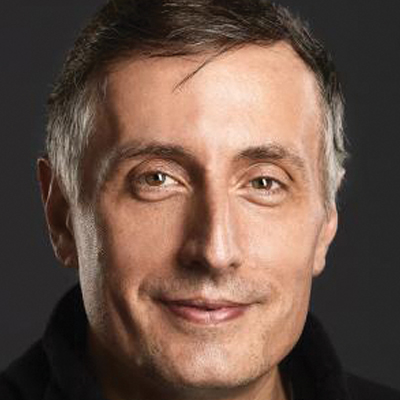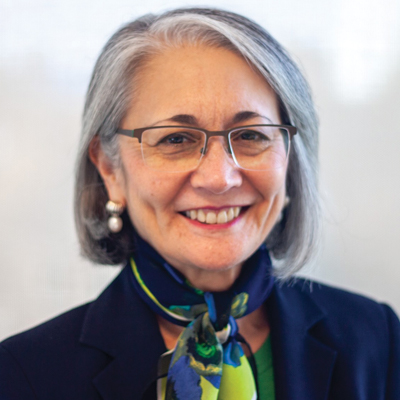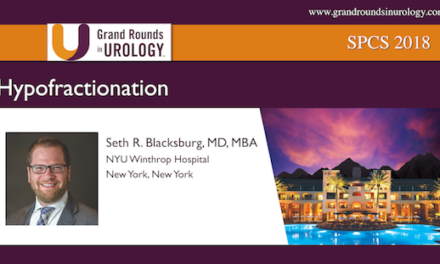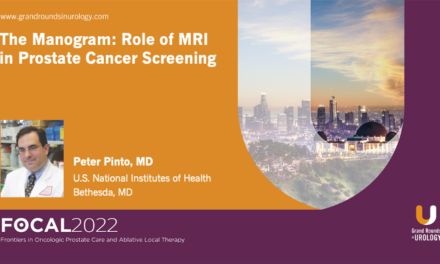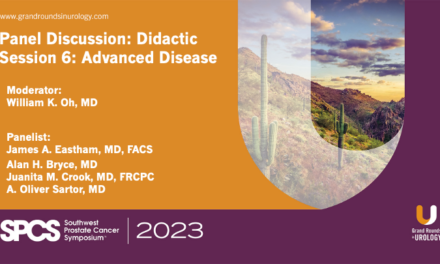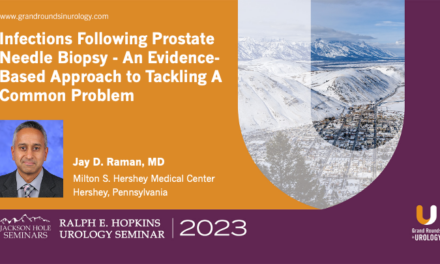Mark A. Moyad, MD, MPH, and Celestia S. Higano, MD, FACP, presented “ADT and Cognitive Health” for the Grand Rounds in Urology audience in July 2022.
How to cite: Higano, Celestia S. and Moyad, Mark A. “ADT and Cognitive Health.” July 2022. Accessed Oct 2024. https://grandroundsinurology.com/bone-health-and-adt/
ADT and Cognitive Health – Summary
Mark A. Moyad, MD, MPH, the Jenkins/Pokempner Director of Preventive/Complementary and Alternative Medicine (CAM) at the University of Michigan Medical Center in the Department of Urology in Ann Arbor, Michigan, and Celestia S. Higano, MD, FACP, Adjunct Professor in the Department of Urologic Sciences at the University of British Columbia and Medical Director of the Prostate Cancer Supportive Care Program at the Vancouver Prostate Centre, discuss the current state of androgen deprivation therapy (ADT), its impact on cognitive health, and how patients and physicians should handle its possible impairment of cognition. Dr. Higano outlines the history of research linking ADT and cognitive health, beginning with patients on ADT noticing changes in their cognitive ability that would disappear after treatment, leading to formal testing of cognition before and during therapy. Formal testing eventually found a 3.3% rate of cognitive impairment. This data was backed up by brain scans showing the changes to cognition to resemble the signs of early Alzheimer’s disease. Dr. Higano concludes that despite conflicting evidence and study results, there is likely some negative impact of ADT on cognition but it is likely very small. Dr. Moyad asks how clinicians should use that information, leading to the two discussing how the keys to heart health (high-quality diet, weight loss, lower blood pressure and blood sugar, exercise, not smoking, not drinking, etc.) also impact cognitive ability. Dr. Higano also discusses Darolutamide as a preferred option for older patients due to it being the only novel anti-androgens with the inability to cross the blood-brain barrier. The two conclude that it is important to maintain heart-healthy habits to also benefit the brain and to identify the signs of cognitive impairment in case they do occur.
For more from Drs. Moyad & Higano on androgen deprivation therapy, listen to their discussion on ADT and Bone Health.
About the Authors
Mark A. Moyad, MD, MPH
Dr. Moyad is the Jenkins/Pokempner Director of Preventive/Complementary and Alternative Medicine (CAM) at the University of Michigan Medical Center in the Department of Urology. He occupies an endowed position, which was originally created and funded entirely by the patients he has helped over the past 25+ years. This was the first endowment of its kind created for a physician at a major medical center in the US. Dr. Moyad has always considered himself to be, first and foremost, a physician public health educator. Dr. Moyad believes in the power of lifestyle changes to improve overall mental, physical, and spiritual wellness, and in their potential ability to keep pill counts and dosages to a minimum, while also enhancing the impact of conventional treatments when needed. This has been the focus of his research and lectures his entire career. Dr. Moyad received his medical education from the University of South Florida College of Public Health and the Wayne State University School of Medicine. He is the primary author of over 150 published medical journal articles on the subject of lifestyle changes and supplements, the past Editor-in-Chief of the medical journal Seminars in Preventive & Alternative Medicine, and has given 1000s of lectures around the world to public and health care professionals in virtually every medical specialty and major medical center. Dr. Moyad is the author or co-author of 15 academic and consumer books, including the Integrative Medicine Clinical/Teaching Guidebooks, the Promoting Wellness series for patients, and his public bestseller The Supplement Handbook. He is honored to be the moderator of one of the largest patient conferences held twice a year in Los Angeles, California, and has provided monthly educational clinical research updates for the last 15+ years to health care professionals and national patient advocacy groups. He has been a consultant and/or interviewed for most major magazines, websites, radio and television shows devoted to health in the US, and appears regularly on a variety of programs.
Celestia S. Higano, MD, FACP
Celestia (Tia) S. Higano, MD, FACP, was formerly a Professor in the Departments of Medicine and Urology, Division of Medical Oncology at the University of Washington, and Clinical Division of Fred Hutchison Cancer Research Center. She is an Adjunct Professor in the Department of Urologic Sciences at the University of British Columbia. She has been the Medical Director of the Prostate Cancer Supportive Care Program at the Vancouver Prostate Centre since 2013.
Dr. Higano received her medical degree from the University of Massachusetts Medical School and completed her residency at the Mayo Graduate School of Medicine in Rochester, MN. She was an oncology fellow under E. Donnall Thomas and Robert B. Livingston at the Fred Hutchison Cancer Research Center and the University of Washington.
Dr. Higano is an internationally renowned expert and clinical researcher focusing on prostate cancer. At UW, she led the prostate cancer clinical research group that participated in developing agents such as zoledronic acid, sipuleucel-T, enzalutamide, apalutamide, abiraterone, radium 223. Over these years, her clinical research has impacted the standards of care for patients with prostate cancer. She is a passionate educator and mentor and has guided many fellows and young faculty at the University of Washington and elsewhere who have chosen an academic career in GU Oncology.
ABOUT THE AUTHOR
Dr. Moyad’s mission is to promote a greater attention to comprehensive lifestyle changes to improve overall mental, physical, and spiritual wellness along with contributing to more objective education on dietary supplements, OTC, and other potential health options. This has been the focus of his research, writings, and lectures his entire career. He occupies an endowed position, which was originally created and funded by the individuals he has empowered over the past 25+ years. He is the Jenkins/Pokempner Director of Complementary and Alternative Medicine (CAM) Education at the University of Michigan Medical Center in the Department of Urology. This was one of the first endowments of its kind created for a doctor at a major medical center. Dr. Moyad has always considered himself to be first, and foremost, a public health educator with an expertise in clinical/medical epidemiology. Dr. Moyad received his medical education from the University of South Florida College of Public Health and the Wayne State University School of Medicine. He is the primary author of over 150 medical journal publications on lifestyle changes and supplements, the past Editor-in-Chief of the medical journal Seminars in Preventive & Alternative Medicine, past CAM course director for a variety of medical societies, continues to be a guest editor and provide peer review for multiple medical journals, and he has given thousands of lectures around the world to the public and health care professionals in virtually every medical specialty and major medical center. Dr. Moyad is the author or co-author of 15 academic and consumer books, and now interviews other health experts on a variety of global wellness topics to enhance notable health care professional and patient education sources. He is also honored to be the moderator of one of the largest patient conferences held twice a year in Los Angeles, California, and has provided educational clinical research updates for the last 20+ years to health care professionals and national patient advocacy groups.

